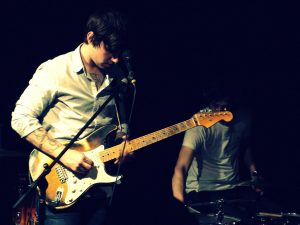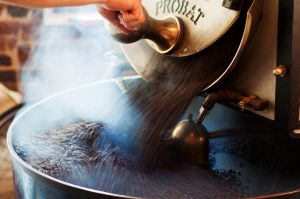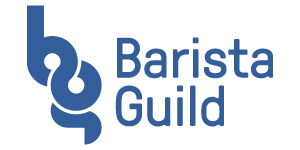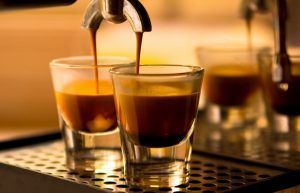Hearing Conservation in the Coffee Industry
As coffee professionals, we are aware of the increased potential for repetitive motion injuries in our industry. We know not to use too much pressure when tamping. We know to switch hands when inserting and removing portafilters. We know to find techniques that cause us no pain while working.
However, hearing health was something I never really considered in my early years of working in coffee, even though I was a musician with two professional musicians as parents. After marrying a Doctor of Audiology, my perspective on hearing health and protection changed. I started to think about how loud our grinders, roasters, and production equipment are.
Many of the roasting companies I have visited and worked for provide hearing protection to the production staff, so this isn’t an unknown danger—at least in production facilities. But let’s review a bit of what is required by the Occupational Safety and Health Administration (OSHA). If you work for a roaster and are exposed to 90 dB TWA (decibels/time weighted average) of noise for an 8-hour period, on a daily basis, your employer must provide you with hearing protection. For reference, 90 dB is similar to a train whistle at 500’.
You may be thinking, “My café is never that loud,” or, “I already wear hearing protection while working.” In a recent article from the International Journal of Audiology, “Knowledge, Attitudes, Behaviors and Noise Exposure of Baristas,” results showed that average dB levels in the café environment ranged from 71 dB to 83 dB.[1] So no, a café environment does not reach that OSHA required hearing protection level—or at least the three cafes in Portland that participated did not. That being said, there is certainly a wide spectrum of noise exposure at cafes, and one could assume that there are times at extremely busy cafes where the noise level surpasses 85 dB for an extended period of time. Even though baristas are likely not regularly exposed to dangerously loud noise, there are a few things to note.
Very loud sounds, such as bulk grinders, in conjunction with daily noise exposure can impact hearing sensitivity, even with short usage. Have you ever had a firework go off right next to you and all of a sudden your hearing is noticeably worse than just before? These kinds of temporary threshold shifts are not always temporary. There can be permanent damage to hearing with just a single exposure to extremely loud sounds.
 Also, you know how us baristas like to party? Well, “All 14 baristas who reported attending music events reported experiencing ‘pain or ringing’ in their ears after the events. Hearing protection device use was extremely low (only one participant used hearing protection regularly).”[2] The exposure to loud sounds while at work and leisure activities compounds to facilitate conditions which can easily lead to hearing damage.
Also, you know how us baristas like to party? Well, “All 14 baristas who reported attending music events reported experiencing ‘pain or ringing’ in their ears after the events. Hearing protection device use was extremely low (only one participant used hearing protection regularly).”[2] The exposure to loud sounds while at work and leisure activities compounds to facilitate conditions which can easily lead to hearing damage.
Temporary loss of hearing is generally just that—temporary. But that does not mean that it always is. According to two recent studies[3][4], caffeine ingestion may be linked to how quickly hearing recovers after acoustic overstimulation. Both studies looked at the effects of caffeine on hearing recovery after acoustic overstimulation in guinea pigs. These studies provided statistically significant correlations between caffeine ingestion and the ability to recover hearing.
One study notes that their results, “suggest that an individual could be reducing his/her potential recovery from acoustic trauma by having a high intake of caffeine.” It is important to note that this was a pilot study and even the researchers said the results are, “difficult to extrapolate to human counterparts.”[5] The second study had similar findings. “The results of our study demonstrate that a daily dose of caffeine had a negative effect on hearing recovery after AOSEs [acoustic overstimulation events] at multiple frequencies. Once again, the second study notes that, “Further studies are required to determine the effects on humans and possible prophylactic strategies for noise-induced hearing loss.”[6]
The amount of caffeine administered in the studies was substantially different. The 2014 study administered 120mg/kg/day. This is approximately 41, 20 gram input, shots of espresso per day for a 150lb individual – that’s a lot of espresso. The 2016 study administered 25mg/kg/day – the equivalent of approximately 8.5, 20 gram input, shots of espresso per day for a 150lb individual. While both of these studies use more caffeine than the average consumer intakes per day, there are most certainly days where baristas and other coffee professionals consume at least the amount used in the 2016 study. I know I have had a few days where I neared the consumption in the 2014 study.
 One last important note on exposure to loud noises is the potential for the development of tinnitus—intermittent or constant ringing, hissing, buzzing, or whooshing when no external sound source is present. Much of the time, tinnitus is coupled with hearing loss, but not always. Tinnitus can be debilitating and greatly affect quality of life depending on the severity.
One last important note on exposure to loud noises is the potential for the development of tinnitus—intermittent or constant ringing, hissing, buzzing, or whooshing when no external sound source is present. Much of the time, tinnitus is coupled with hearing loss, but not always. Tinnitus can be debilitating and greatly affect quality of life depending on the severity.
So, what can you do to protect your hearing? First and foremost, don’t be afraid or embarrassed to wear hearing protection. If you are roasting or in a production facility all day, wear hearing protection. Foam ear plugs or ear muffs will work, but if you work in an environment that constantly requires hearing protection, I would highly suggest investing in custom (musician’s) plugs. They will be far more comfortable, provide more protection, and depending on the plug, may lower the volume without muffling or distorting the sound. If you go to a lot of concerts, I would highly suggest custom plugs for the previous reasons. I never wore hearing protection at concerts because it affected how the music sounded. With custom plugs, they just lower the volume, which can actually make it a better experience.
Second, if you consistently work in a loud environment, get a hearing test. The sooner, the better. It will establish a baseline for your hearing. Then, get a hearing test every year to see if your hearing is being affected. Much of the time it is difficult to recognize hearing loss since it happens gradually. That being said, if you ever experience a sudden drop in hearing, it is important to go to a doctor immediately, not wait it out. Sudden loss of hearing can be indicative of serious problems and unless dealt with within 72 hours can commonly be permanent.[7]
Lastly, if you are already experiencing hearing loss or tinnitus, go to an audiologist. They can work with you to find a solution—from tips for managing tinnitus to hearing aids.
Coffee can be a loud industry and coffee professionals seem to enjoy loud activities. So let’s take care of ourselves. Let’s be aware of our hearing health in the same way we are aware of our physical health. The difference is that a lot of the physical problems baristas run into—like tendinitis and carpal tunnel—can be reversible or cured, while much of the time hearing loss is permanent. Protect your hearing so you can hear first crack and your favorite bands for years to come.
David Fasman is the Director of Education and Quality Control for Huckleberry Roasters. He is a SCAA Credentialed Instructor and Level 2 Certified Barista. He is a 3 time U.S. Barista Championship competitor, a member of the BGA Executive Council and vice chair of the membership committee, and is the author of seedtocupcoffee.wordpress.com.
References
[1] Pursley, Alyssa J., and Gabrielle H. Saunders. "Knowledge, Attitudes, Behaviors, and Noise Exposure of Baristas." International Journal of Audiology 55.3 (2016): 184-88. Web.
[2] Pursley, Alyssa J., and Gabrielle H. Saunders. "Knowledge, Attitudes, Behaviors, and Noise Exposure of Baristas." International Journal of Audiology 55.3 (2016): 184-88. Web.
[3] Mujica-Mota, Mario A., Karina Gasbarrino, Jamie M. Rappaport, Robert S. Shapiro, and Sam J. Daniel. "The Effect of Caffeine on Hearing in a Guinea Pig Model of Acoustic Trauma." American Journal of Otolaryngology 35.2 (2014): 99-105. Web.
[4] Zawawi, Faisal, Aren Bezdjian, Mario Mujica-Mota, Jamie Rappaport, and Sam Joseph Daniel. "Association of Caffeine and Hearing Recovery After Acoustic Overstimulation Events in a Guinea Pig Model." JAMA Otolaryngology–Head & Neck Surgery 142.4 (2016): 383. Web.
[5] Mujica-Mota, Mario A., Karina Gasbarrino, Jamie M. Rappaport, Robert S. Shapiro, and Sam J. Daniel. "The Effect of Caffeine on Hearing in a Guinea Pig Model of Acoustic Trauma." American Journal of Otolaryngology 35.2 (2014): 99-105. Web.
[6] Zawawi, Faisal, Aren Bezdjian, Mario Mujica-Mota, Jamie Rappaport, and Sam Joseph Daniel. "Association of Caffeine and Hearing Recovery After Acoustic Overstimulation Events in a Guinea Pig Model." JAMA Otolaryngology–Head & Neck Surgery 142.4 (2016): 383. Web.
[7] "Interview with Kaela Fasman, Au.D., CCC-A." Personal interview. 22 Aug. 2016.

